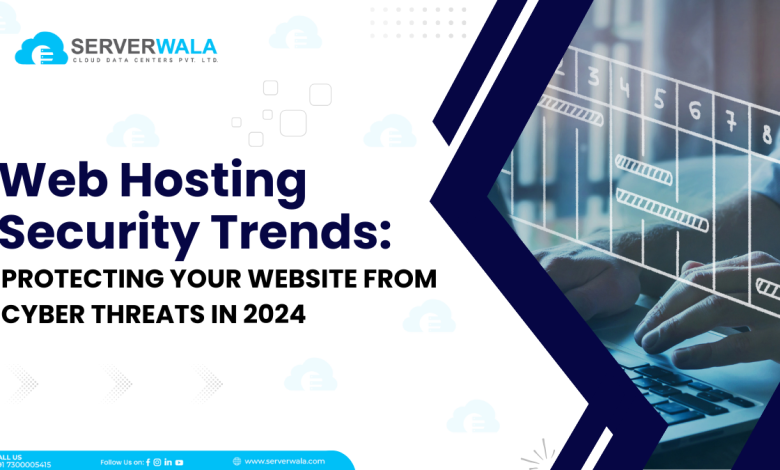Web Hosting Security Trends: Protecting Your Website from Cyber Threats in 2024

Introduction
In an era dominated by digital presence, web hosting security remains a critical concern for website owners and administrators. As we navigate the evolving landscape of cybersecurity threats, it’s imperative to stay ahead of the curve in safeguarding your online assets. This blog post explores the latest trends in web hosting security and equips you with practical insights on how to protect your website from potential cyber threats in 2024.
The Most Common Website Security Weaknesses
When it comes to safeguarding your online presence, understanding and addressing the most common website security weaknesses is paramount. In the ever-evolving landscape of web hosting security, two persistent threats demand our attention: SQL injections and attacks through outdated CMS, plugins, and scripts. In this section, we’ll delve into these vulnerabilities and explore proactive measures on how to protect your website from potential cyber threats in 2024.
1. SQL Injections: Unraveling the Threat
SQL injections continue to be a prevalent menace for web applications, allowing attackers to manipulate databases and potentially gain unauthorized access to sensitive information. Recognizing the signs of SQL injection attempts is crucial for fortifying your web hosting security.
Signs of a SQL Injection Attack:
Unusual Database Activity:
Keep a vigilant eye on your database logs for abnormal queries or unexpected data retrieval patterns.
Error Messages Revealing SQL Code:
Attackers often exploit susceptibilities by injecting malicious SQL code. Regularly review error messages to detect any signs of such injections.
Unexpected Data Exposure:
If your website starts displaying or handling data in unintended ways, it might be an indication of an SQL injection attempt.
How to Protect Your Website from SQL Injections:
Parameterized Statements:
Implement parameterized queries to ensure that user inputs are treated as data & not implementable code.
Input Validation:
Scrutinize and validate user inputs rigorously to stop malicious data from getting into your database.
Least Privilege Principle:
Restrict database user permissions to the bare minimum required for functionality, reducing the potential effect of a successful SQL injection.
2. Attacks Through Outdated CMS, Plugins, and Scripts
Cybercriminals often exploit vulnerabilities in outdated Content Management Systems (CMS), plugins, and scripts, making regular updates a cornerstone of your defense strategy.
Signs of Attacks Through Outdated Components:
Unexplained Website Downtime:
Outdated software can be a gateway for attacks, leading to unexpected downtimes as hackers exploit vulnerabilities.
Unusual Website Behavior:
If you notice unexpected changes in your website’s functionality or appearance, it can be an indication of a compromised CMS or plugin.
Security Alerts from Providers:
Keep an eye on security alerts from your CMS provider or plugin developers. Avoiding these warnings might leave your website vulnerable to known susceptibilities.
How to Protect Your Website from Outdated Component Attacks?
Regular Updates:
Stay diligent in keeping your CMS, plugins, and scripts up to date. This simple yet effective measure can patch known vulnerabilities and bolster your web hosting security.
Automatic Updates:
Permit automatic updates as & when possible to ensure that your website is protected against emerging threats without manual intervention.
Vetted Plugins and Themes:
Only use plugins & themes from recognized sources, and frequently audit your installed components for security updates.
Tips for Securing and Protecting your Website
1. Get an SSL Certificate: Encrypting Your Connection
Securing your website’s connection is paramount in the realm of web hosting security. Acquiring an SSL certificate is a fundamental step toward achieving this goal. SSL encrypts the data exchanged between your website & its visitors, thwarting potential cyber attacks aimed at intercepting confidential information. In addition to fortifying your site’s trustworthiness, SSL enhances online security, making it an essential component in the ongoing battle against common website attacks.
2. Use Secure Passwords: A Digital Gatekeeper
Your website’s first line of defense is a robust password system. Crafting secure, unique passwords for your accounts serves as a digital gatekeeper, deterring unauthorized access attempts. Incorporate a diverse integration of uppercase & lowercase letters, nos., & special characters into your passwords. Routinely updating these credentials and steering clear of easily guessable combinations significantly strengthens your web hosting security, protecting your website from potential breaches.
3. Update Your CMS and Any Add-ons: Patching the Vulnerabilities
Constant vigilance is crucial in the ever-evolving landscape of web hosting security. Regularly updating your Content Management System (CMS) and associated add-ons is a proactive measure against emerging susceptibilities. Developers consistently release updates that patch potential entry points for website attacks. Staying current is not merely a best practice; it’s a strategic defense strategy to safeguard your website and protect against common website attacks.
4. Automatic Daily Backups: Safeguarding Your Data
In the dynamic realm of online threats, preparing for the unexpected is a cornerstone of effective web hosting security. Implementing automatic daily backups serves as a safeguard net for the data of your website. In the unfortunate event of a cyber attack or unforeseen data loss, having recent and reliable backups allows you to swiftly restore your website to a secure state. This strategic approach strengthens your ability to protect your website, ensuring the continuity of your online presence.
5. Approve Files or Comments Manually: Exercise Caution
User-generated content poses inherent risks to web hosting security. Approving files or comments manually adds an extra layer of scrutiny, minimizing the chances of malicious content infiltrating your website. While automation streamlines processes, exercising caution in content approval reinforces your defenses against potential cyber attacks and aligns with best practices on how to protect your website effectively.
6. Defend Against SQL Injection Attacks: Fortifying Your Database Security
In the intricate landscape of web hosting security, database protection is paramount. SQL injection attacks remain a persistent threat, making it imperative to fortify your database security. Validate and sanitize user inputs rigorously to thwart potential cyber attacks. The implementation of parameterized queries is a robust measure that prevents attackers from injecting malicious code, preserving the integrity of your data and strengthening your defense against common website attacks.
7. Beware of Error Messages: Concealing Vulnerabilities
Error messages, though informative, can inadvertently expose vulnerabilities in your web hosting security. Customizing error messages to reveal minimal information and providing generic responses is a strategic approach to concealing potential entry points for cybercriminals. By minimizing the insights gained from error messages, you enhance your website’s security posture, thwarting potential attacks, and fortifying your defenses against the signs of cyber attacks.
8. Make Sure Your Software is Up to Date: A Continuous Endeavor
In the ever-evolving landscape of web hosting security, maintaining the currency of your software components is an ongoing endeavor. Regularly checking and updating all software, including server software and third-party applications, is a proactive measure against potential vulnerabilities. Outdated software is a prime target for cyber attacks, and a commitment to keeping your environment up to date is a strategic and continuous effort in fortifying your web hosting security.
A robust firewall is a stalwart guardian in the battle against unauthorized access and potential website attacks. Implementing a strong firewall to monitor and control incoming and outgoing network traffic adds an extra layer of defense to your web hosting infrastructure. By actively blocking unauthorized access attempts, your firewall serves as a digital barrier, safeguarding your website and reinforcing your web hosting security strategy against evolving online threats.
10. Use Multi-Factor Authentication: Fortifying Access Controls
Elevate your access controls by implementing multi-factor authentication (MFA). Requiring users to provide multiple forms of recognition, like a password and a one-time authentication code, significantly reduces the risk of unauthorized access. This strategic measure not only fortifies your web hosting security but also aligns with best practices on how to protect your website effectively against potential cyber-attacks, enhancing the overall resilience of your online presence.
11. Implement a Cyber Security Risk Assessment Process: Strategic Defense Planning
In the ever-changing landscape of cybersecurity, adopting a proactive approach is paramount. Regularly assessing your website’s cybersecurity risks is a strategic defense planning process. Identifying potential vulnerabilities, evaluating their impact, and implementing measures to mitigate risks empower you to stay one step ahead of emerging threats. This structured risk assessment process is not only a best practice in web hosting security but also a proactive strategy in fortifying your website against the signs of cyber attacks and enhancing the overall resilience of your online presence.
Also Read: AI was excellent last year? Wait and See what’s coming next to change the Experience of Web Hosting
Conclusion
In navigating the intricate realm of web hosting security, the conclusion draws attention to the dynamic and ever-evolving nature of safeguarding your digital assets. Acknowledging the fluid landscape of online attacks, the provided tips offer a comprehensive guide on how to protect your website against common threats.
From SSL certificates to proactive measures against SQL injections, the strategic tips underscore the importance of continuous vigilance and adaptability. As we peer into 2024, emerging trends like AI-powered threat detection and zero-trust architecture emphasize the need for website owners to embrace evolving technologies in their defense strategies.
Beyond technical measures, the conclusion stresses the importance of fostering a cybersecurity culture, educating teams, and promoting a collective commitment to online security. In essence, securing your website is not a static task but an ongoing commitment that weaves together technology, strategic planning, and a collective mindset focused on a safer digital landscape.





